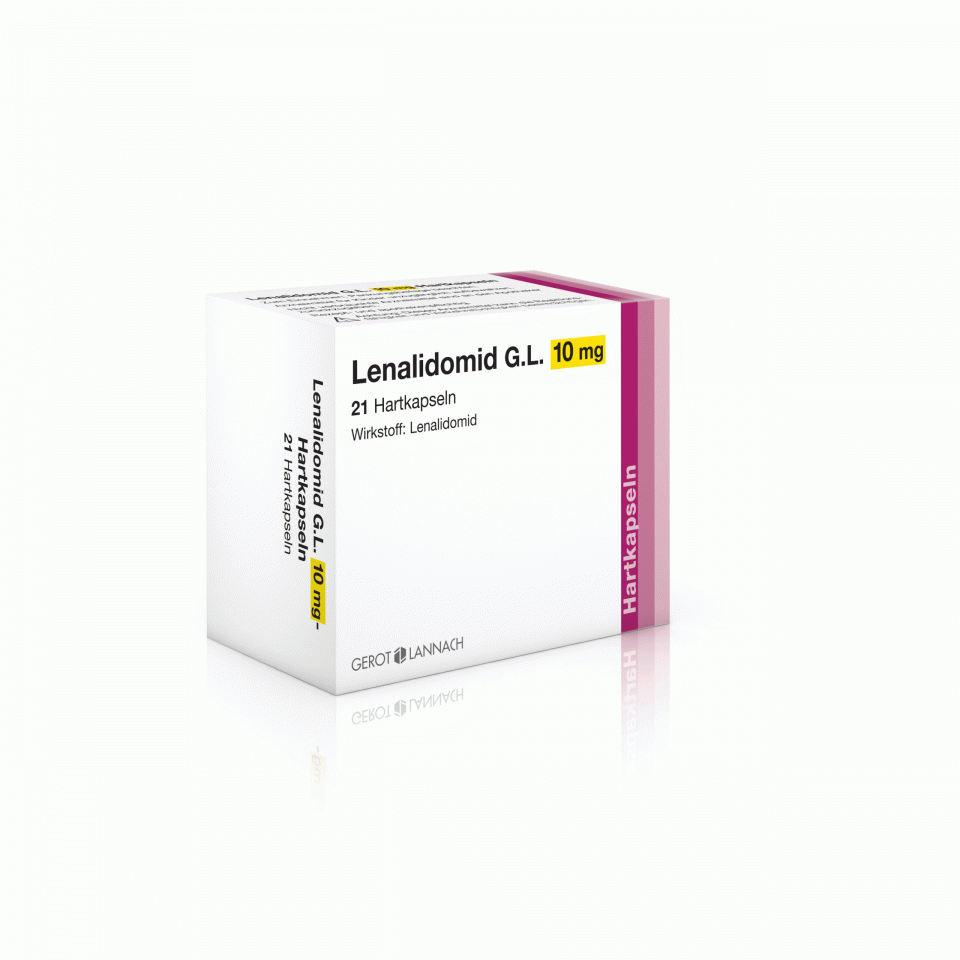 Site intended for UK
audience
Site intended for UK
audience
Lenalidomide G.L. contains the active substance “lenalidomide”. This drug belongs to a group of drugs that affect the functioning of the immune system.
Lenalidomide G.L. is used in adults with:
Multiple Myeloma
Multiple myeloma is a type of cancer that affects certain white blood cells called plasma cells. These cells accumulate in the bone marrow and divide uncontrollably. This can cause damage to the bones and kidneys.
Multiple myeloma generally cannot be cured. However, the signs and symptoms can be greatly diminished or even disappear completely for a time. In this case, the disease is called “remission.”
Newly diagnosed multiple myeloma – in patients after a bone marrow transplant:
In this indication, lenalidomide G.L. is used alone and after adequate recovery from transplantation as maintenance therapy.
Newly diagnosed multiple myeloma- in patients who cannot undergo bone marrow transplantation:
Lenalidomide G.L. is taken with other drugs:
At the beginning of treatment, these other drugs should be taken together with lenalidomide G.L.; later, only lenalidomide G.L. should be taken.
If the patient is 75 years of age or older, or if renal function is moderately or severely impaired, the physician will carefully evaluate the patient before starting treatment.
Multiple myeloma – in patients who have received prior treatment:
Lenalidomide G.L. is taken in combination with the anti-inflammatory drug “dexamethasone”.
Lenalidomide can stop the worsening of signs and symptoms of multiple myeloma. Lenalidomide G.L. has also been shown to delay the recurrence of multiple myeloma after treatment has been given.
Myelodysplastic Syndromes (MDS)
MDS refers to a group of different diseases of the blood and bone marrow. The blood cells develop abnormally and are unable to perform their function properly. Affected patients may have a number of signs and symptoms, including low red blood cell counts (anemia), require blood transfusions, and have an increased risk of infection.
Lenalidomide G.L. is used alone to treat adult patients diagnosed with MDS when the following criteria are all met:
Lenalidomide G.L. may increase the number of healthy red blood cells made in the body by decreasing the number of abnormal cells:
Mantle Cell Lymphoma (MCL)
MCL is a cancer of a part of the immune system (lymphoid tissue). It originates from certain white blood cells called “B lymphocytes” or B cells. In MCL, the B cells grow in an uncontrolled manner and accumulate in the lymphatic tissue, bone marrow or blood.
Lenalidomide G.L. alone is used to treat adult patients who have been pre-treated with other drugs.
Follicular Lymphoma (FL)
FL is a slow-growing cancerous tumor of B lymphocytes. These cells are part of the white blood cells that are responsible for fighting infection in the body. When a patient has FL, too many of these B lymphocytes can accumulate in the blood, bone marrow, lymph nodes and spleen.
Lenalidomide G.L. is used with another agent called “rituximab” to treat adult patients with pretreated follicular lymphoma.
| Strength | Pack size |
| 2,5 mg | 21 |
| 5 mg | 21 |
| 7,5 mg | 21 |
| 10 mg | 21 |
| 15 mg | 21 |
| 20 mg | 21 |
| 25 mg | 21 |







We ask for your understanding that due to the Austrian Medicines Act, certain further information is only accessible to medical professionals.
Login